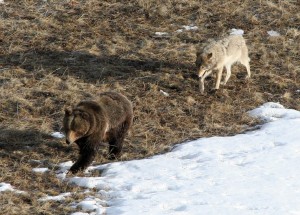Background
The U.S. Fish and Wildlife Service has proposed to remove gray wolves from the protections of the Endangered Species Act throughout most of the continental U.S. Removing federal protections, especially for wolves in the Pacific region, is premature. Take action today and make your voice be heard! More information below, including how to submit your comment letter. Comment deadline is September 11, 2013.
Removing protections is premature
The Obama administration has recently proposed to remove Endangered Species Act protections for gray wolves in most of the lower 48 states – including the Pacific West. The federal government is now asking for public comments on the proposal.
Wolves deserve to remain protected under the Endangered Species Act until they have fully recovered, especially vulnerable packs such as those just returning to the Pacific West region. While wolves have made a remarkable rebound in the northern Rockies and western Great Lakes over the past 15 years, those areas represent only a small portion of their historic range. Federal protections for wolves in the northern Rockies and western Great Lakes states were removed in 2011-2012. And now, even though scientists have identified hundreds of thousands of acres elsewhere in the lower 48 where wolves could return, the U.S. Fish and Wildlife Service wants to remove protections in those places. This political decision isn’t justified by science and leading wolf scientists have expressed their concerns (here and here). We need your help in telling newly- appointed Secretary of the Interior Sally Jewell that this proposal is premature and that wolves need comprehensive, not piecemeal, recovery.
Urge the Department of the Interior to protect gray wolves as they continue to make their historic comeback in the U.S.
Key messages to include in your comments:
• Wolves perform a crucial role in maintaining wildlife diversity and ecosystem function. The U.S. Fish and Wildlife Service’s decision to turn their backs on wolves means millions of acres of habitat will be without the benefits from wolves for years or decades to come – and some areas may never see the return of wolves.
• Wolves west of the Rockies are few in number and at a fragile stage. Loss of protection now could put at risk “seed” packs like the Teanaway and Wenatchee Packs in Washington State that are critical to establishing a viable population in the Pacific West.
• Wolves are still dispersing into their historical range in the Pacific West states of Washington, Oregon and California. In 2011, a lone wolf known as OR-7 dispersed from the Imnaha Pack in Oregon to wander through California’s southern Cascades and Modoc Plateau. OR-7 was the first wolf to enter the state of California in nearly 90 years. Federal protection under the Endangered Species Act allows for the continued safety of wolves as they return to their historic range in the Pacific West.
• Though some states in the Pacific West region such as Washington and Oregon have state plans that call for recovery in the Cascades/Coast region, California is just now developing its state wolf plan and many other states with good wolf habitat but no wolves yet are lacking recovery plans altogether. Furthermore, state penalties for poaching a wolf are minimal and subject to local politics. Without the stricter penalties that come with Endangered Species Act protection (up to $50,000 and a year in jail), discouraging illegal killing is much more of a challenge.
• The U.S. Fish and Wildlife Service should maintain federal protections for wolves across the Lower 48 and recognize Pacific West wolves as a distinct population. This would provide meaningful protection where adequate state recovery plans are still lacking.
Personalizing your message makes a strong statement for wolves. Comment deadline is September 11.
Sample letter:
Interior Secretary Sally Jewell
U.S. Department of the Interior
1849 C Street, N.W.
Washington DC 20240
Dear Secretary Jewell,
I am writing to express my concern about the U.S. Fish and Wildlife Service's proposal to remove protections for wolves across most of the lower 48 states.
The recovery of wolves in the northern Rocky Mountains and western Great Lakes has seen tremendous success. The job of recovery, however, is not done. Scientists have identified suitable habitat for wolves in the southern Rocky Mountains, Pacific West, Northeast and elsewhere.
Wolves have just begun to return to the Pacific West in places such as the Cascade Mountains. These wolves would lose federal protection under the delisting proposal, making this fragile population more vulnerable and potentially setting back recovery in the entire Pacific West region.
Pacific West wolves include descendants of wolves living in coastal British Columbia, as well as the northern Rockies. Scientists have also pointed to the fact that some wolves returning to the Pacific West are genetically distinct from the reintroduced northern Rockies wolves. Over time, these wolves have adapted to local climatic and habitat conditions, creating a unique genetic profile. Currently, there are only three confirmed packs and two confirmed breeding pairs in the Cascade Range, which spans from Washington to northern California.
I strongly oppose the proposal to remove protections for wolves in these and other areas. Please also recognize Pacific West wolves as a distinct population. This will provide robust protections where state recovery plans are still lacking.
Please do not give up on wolf recovery in such an early stage of success – don't remove Endangered Species Act protections for wolves in the lower 48 states.
Sincerely,
[YOUR NAME & ADDRESS]

